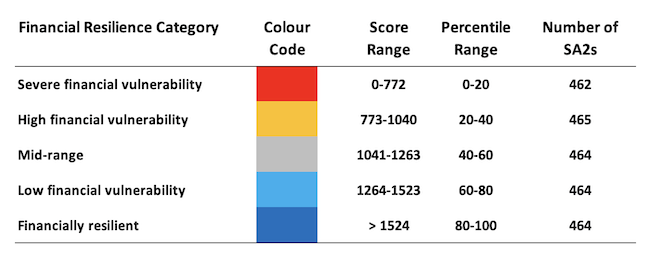

Released October 13, 2023.
The Centre of Full Employment and Equity, University of Newcastle and the Cities Research Institute, Griffith University developed the Financial Resilience Barometer (FRB) for small regions across Australia. The FRB is a collaboration between Professors William Mitchell (CofFEE) and Scott Baum (Griffith University) and is funded by an Australian Research Council (ARC) Discovery Program Grant: DP230101205 Regional resilience to economic shocks: Australia’s COVID Economic slowdown .
The Financial Resilience Barometer is an index that rates areas across Australia in terms of their level of financial security or vulnerability. The construction of the FRB Index is explained in the Technical Report (see link below).
We utilise the Australian Bureau of Statistics (ABS) Statistical Areas Level 2 (SA2s) as our spatial unit of analysis. Their purpose is to represent a community that interacts together socially and economically. In large cities, they can be thought of as largely representing one or a few small suburbs, while in rural areas they represent a town or a town’s surrounds, or both combined.
Measuring financial resilience at the community level also feeds into the long-standing and established research into the spatial distribution of socio-economic disadvantages and inequality. Understanding the associations between geography or space and well-being, social exclusion, inequality or poverty has been a part of the social science research landscape for many decades.
We deploy a multidimensional framework, which considers financial resilience across four axes:
The FRB divides SA2s into five categories depending on its FRB Index score:

It should be noted that the underlying modelling used to compute the FRB takes into account both suburb and individual characteristics. Hence, any one person or household who resides in what may be a community with severe financial vulnerability may not themselves suffer financial insecurity. Similarly, a person or household who may reside in a relatively more financially resilient community may in fact be in high financial distress.
The Mapping Tool provides a fully searchable map to explore the FRB for all localities included. The maps are presented for Australia as a whole (but the layering is very slow). To speed up the map layers, we also provide State/Territory breakdowns.
You can resize the maps and move them using the mouse or arrow keys. If you click particular SA2 regions of interest further information will appear.
Select the map you desire
Please select a Regional aggregate from the list below (they are ordered by Greater capital city and Rest of State/Territory, except for the ACT) and choose the way you want the SA2 within that aggregate to be ordered in the table that is generated.
| Choose Region | |
| Choose ordering | |
The Australian Financial Resilience Barometer: An Index for Australian Localities - includes an explanation of the methodology used to calculate the Financial Resilience Barometer, commentary and the major policy recommendations.